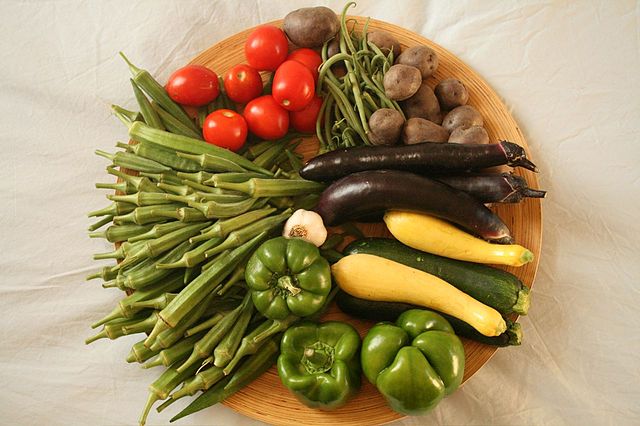
By Scott Etkin
This is West Side Rag’s third article for Earth Month. Part I offered tips for recycling and Part II explained rules for composting.
Upper West Side farmers’ markets are crowded each weekend with locals looking for top-quality produce. But there is another, lesser-known, way to find it, while also supporting local farmers, and promoting a more sustainable food system. It’s called, “community-supported agriculture (CSA).”
Read on for an explanation of CSAs, their benefits and potential drawbacks, and a few options for ones to join in the neighborhood.
What is Community-Supported Agriculture?
Subscribers to a community-supported agriculture plan receive food from a local farm throughout harvest season. Unlike a farmer’s market, where shoppers pick what they want, a CSA subscriber typically gets a pre-packed bag of assorted fruits and vegetables (and in some cases eggs and meat) once a week. The bag is ready for pick-up at a designated site each week.
Promoters of CSAs say they foster community and strengthen the connection between consumers and the farms and farmers their food comes from. Many promote the community spirit with an element of shared labor: in rural areas, subscribers may be asked to work a shift on the farm, whereas in cities subscribers might be required to sign up to staff the location where subscribers pick up their weekly bags.
Why join a CSA?
CSA advocates say subscribing to this farm-to-table food option promotes sustainability, in a country where agriculture accounts for more than 10% of greenhouse gas emissions, according to the USDA.
Modern agriculture markets, in which “the customer and the farmer are in opposition: the customer tries to get the lowest price and the farmer tries to get the highest,” writes Appropropriate Technology Transfer for Rural Areas, an environmental organization, can lead to unsustainable agriculture practices, such as the poor treatment of animals, monocropping that causes topsoil erosion, and the spraying of pesticides to increase yields.
CSAs, conversely, pursue an alternative model in which “the customer and the farmer work through cooperation and agree on the prices beforehand,” thereby allowing farmers to prioritize more sustainable agriculture practices.
There’s no one standard, but farmers who grow for CSAs tend to raise a variety of organic fruits and vegetables, which is better for soil than monocropping (growing just one type of product to maximize yields). CSAs also tend to reduce food waste, because farmers distribute all of their harvest to subscribers (those who take their produce to farmers’ markets don’t necessarily sell everything they offer, causing some food waste). And they reduce the distance food is transported to reach consumers (fresh produce is transported an average of more than 1,500 miles before it reaches your plate; buying produce through a CSA can greatly lower that transportation footprint).
CSAs do minimal packaging and labeling of food, so there is less plastic waste – including plastic films that can’t be recycled – than with grocery store produce. They support local farmers, who have a more stable and predictable income source when their food goes to subscribers. And eating more produce, particularly when it’s in season, is considered fundamental to a healthy diet.
Are there downsides to a CSA subscription?
CSAs generally don’t give people the choice of which fruits and vegetables they receive in their bag. So your weekly assortment might sometimes include something that you don’t like. On the flip side: you may end up trying produce you haven’t bought before and find a new favorite.
CSAs typically have an upfront cost of about $20 to $25 per week. This might be more than you spend at your typical supermarket, but this probably depends on where you shop and what’s on your grocery list. For CSA subscribers, there’s the added logistics of picking up the week’s bag within a certain time frame, which might be a challenge for some people depending on their schedules.
CSA produce generally doesn’t have as long a shelf life as produce bought at the grocery store, so you should be prepared to cook it within a few days of receiving the bag. This is partly because grocery store produce is often treated to make it less perishable.
Are there any CSAs I can join on the Upper West Side?
New York City got its first CSA in 1995, according to a City Council report, and now there are dozens of CSAs across the five boroughs, including several on the UWS. If there are any active CSAs in the neighborhood that we’re missing from this list, please feel free to share in the comments.
- Sourced from a family farm in Germantown, NY, in the Hudson Valley, approximately 100 miles north of the UWS.
- The full 2024 season runs from June 5th to November 20th. There’s also a partial season option.
- The weekly bag pick-up is at Rutgers Church, 236 West 73rd Street, between Broadway and West End on Wednesdays from 3:30 p.m. to 8:30 p.m.
- Registration and more details are available at the link.
- Sourced from Hepworth Farms, a seventh generation family-owned farm in Milton, NY, approximately 70 miles north of the UWS.
- The full 2024 season runs from June 11th through November 19th. There’s also a shorter 15-week option.
- The pick-up takes place at Church of St. Paul & St. Andrew (263 West 86th Street and West End Avenue) on Tuesdays from 4:00 p.m. to 7:30 p.m.
- Registration and more details are available at the link.
- Sourced from a 375-acre family farm in Kinderhook, NY, approximately 125 miles north of the UWS, that has been in operation for more than two decades.
- The 2024 season runs from early June and goes until the week before Thanksgiving.
- There are two options for pick-up locations. The first is at Church of St. Paul and St. Andrew on the corner of West 86th Street and West End Avenue on Thursdays from 4 p.m. to 7 p.m. The second option is at Broadway Presbyterian Church at 601 West 114th Street and Broadway on Thursdays from 3 p.m. to 6 pm.
- Registration and more details are available at the link.
An alternative to these CSAs is Farm to People, a Brooklyn-based company that offers local produce but also has more choice in products and does home delivery. Farm to People delivers throughout the city, sourcing from a network of more than 150 farms within 300 miles of the city. In addition to produce, Farm to People can also include a variety of drinks, pantry items, baked goods, and other common grocery items in your order.
Subscribe to West Side Rag’s FREE email newsletter here.










Great article. We’ve been using Farm to People for over three years and love it!
I was a member of both Cream of the Crop as well as Roxbury Farms over the years depending in which day worked better for my schedule. The vegetables actually stayed fresher LONGER than store bought. The meats at Roxbury farms are insanely amazing. Worth the price.
I’m so happy with the local CSA options, having used both Hearty Roots and Roxbury. I’m curious to hear a review from someone who has tried Cream of the Crop, as it is just as convenient but more expensive. Can anyone make a comparison between the CSAs to help me decide for the future? Thanks.
Hi Valentina,
I tried Hearty Roots and now with Cream of the Crop (both on the UWS) and definitely happier –
Hearty Roots on the UWS offers small veggie boxes. We (household of two) eat many veggies, so we bought a double share, but eventually it was a large quantity of veggies but not many types. We switched to Cream of the Crop and the variety is great both for the regular share and the family size share. We also enjoyed the added option of the exchange bin (so nothing goes to waste) and the add-ons (the yogurt is great!!!).
The produce, as expected, are really fresh and taste great, and the fruit share is very generous (and sweet :-).
I’ve been a member of Roxbury since they first came to the UWS. I highly recommend them. Veggies last a long time. They are not bagged for pickup. You pick your allotment. There is even an exchange bin. The veggies not picked up are donated to the food pantry at the church on 86 street. There are options for fruit share, eggs, or meat shares.
We’ve been using Rustic Roots for a few months now and are very satisfied. They partner with farmers Upstate, LI, Connecticut and Pennsylvania and source everything from organic fruit and veg, to poultry, fish, meat, dairy and even pantry items. There is a minimum and what I think is a very reasonable delivery charge. I highly recommend them!
We’ve been members of Cream of the Crop since we moved to NYC in 2018. Things have changed over the years (during Covid the farm switched to pre-boxed veggie shares), but we still love the food. They also have a lot of locally sourced add-ons (meat, bread, dairy, eggs) – we love the cheese share and yogurt. Unclaimed produce is donated the food pantry on site. Volunteer requirement is easy and a great way to meet other people. So happy to see CSAs getting some love!
My wife and I have been members of The Cream of the Crop (COTC) CSA for almost 10 years now. We absolutely love the assortment of fresh vegetables and fruits as well as well optional shares (meats, cheeses, dairy and more). And it’s such an easy way to get a great assortment of vegetables delivered close to home. Yes, we’ve gotten some vegetables we had no idea what to do with. Members suggest ways how to cook them. The COTC also has a “swap” bin where you can trade for another item. We look forward to the COTC season each year!